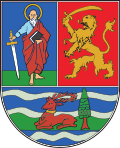| | |||||||||||||||||||||||||||||||||||||||||||||||||||||||||||
| |||||||||||||||||||||||||||||||||||||||||||||||||||||||||||
All 120 seats in the Assembly of Vojvodina 61 seats needed for a majority | |||||||||||||||||||||||||||||||||||||||||||||||||||||||||||
This lists parties that won seats. See the complete results below.
| |||||||||||||||||||||||||||||||||||||||||||||||||||||||||||
  |
|---|
Provincial elections were held in Vojvodina in May 2012. [1] The first round was held on 6 May, while the second round was held on 20 May.